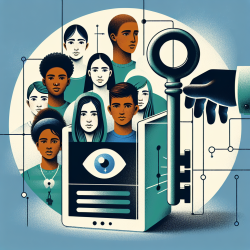Embracing Change: Transforming Educational Practices in a Virtual World
The COVID-19 pandemic has been a catalyst for change in many sectors, and education is no exception. For practitioners in the field of education, particularly those involved in online therapy services like TinyEYE, understanding the implications of virtual learning is crucial. The research article "Analysis of Pre-clerkship Medical Students’ Perceptions and Performance During the COVID-19 Pandemic" provides valuable insights that can help improve educational practices in a virtual environment.
Key Findings from the Research
The study surveyed first- and second-year medical students to evaluate their perceptions and performance in a virtual learning environment. The findings highlighted several challenges and opportunities:
- Adjustment Challenges: First-year students (MS1s) reported more difficulty adjusting to virtual instruction compared to second-year students (MS2s). This underscores the importance of face-to-face learning in the initial stages of education.
- Technical Issues: A significant number of students experienced technical difficulties, which impacted their learning experience.
- Social Skills and Connectedness: The virtual environment negatively affected students' social skills and their sense of connectedness to peers, which are crucial for professional development and wellness.
- Performance Impact: The study noted a decrease in student performance in summative exams during the first fully virtual unit, highlighting the need for effective virtual learning strategies.
Implications for Practitioners
For practitioners in the field of education and online therapy, these findings offer several takeaways:
- Enhance Technical Support: Providing robust technical support can help mitigate the challenges students face with virtual learning platforms.
- Foster Social Interaction: Creating opportunities for social interaction, even in a virtual setting, can enhance students' sense of connectedness and support their professional development.
- Tailor Learning Approaches: Recognizing the different needs of first-year and second-year students can help tailor learning approaches to better support their transition to virtual learning.
- Continuous Improvement: Encouraging further research and feedback from students can lead to continuous improvement in virtual learning strategies.
Encouraging Further Research
The study's findings are a starting point for further research into the effectiveness of virtual learning. Practitioners are encouraged to explore additional studies and gather data to refine their approaches. By staying informed and adaptable, educators can continue to provide high-quality education in a virtual world.
To read the original research paper, please follow this link: Analysis of Pre-clerkship Medical Students’ Perceptions and Performance During the COVID-19 Pandemic.










